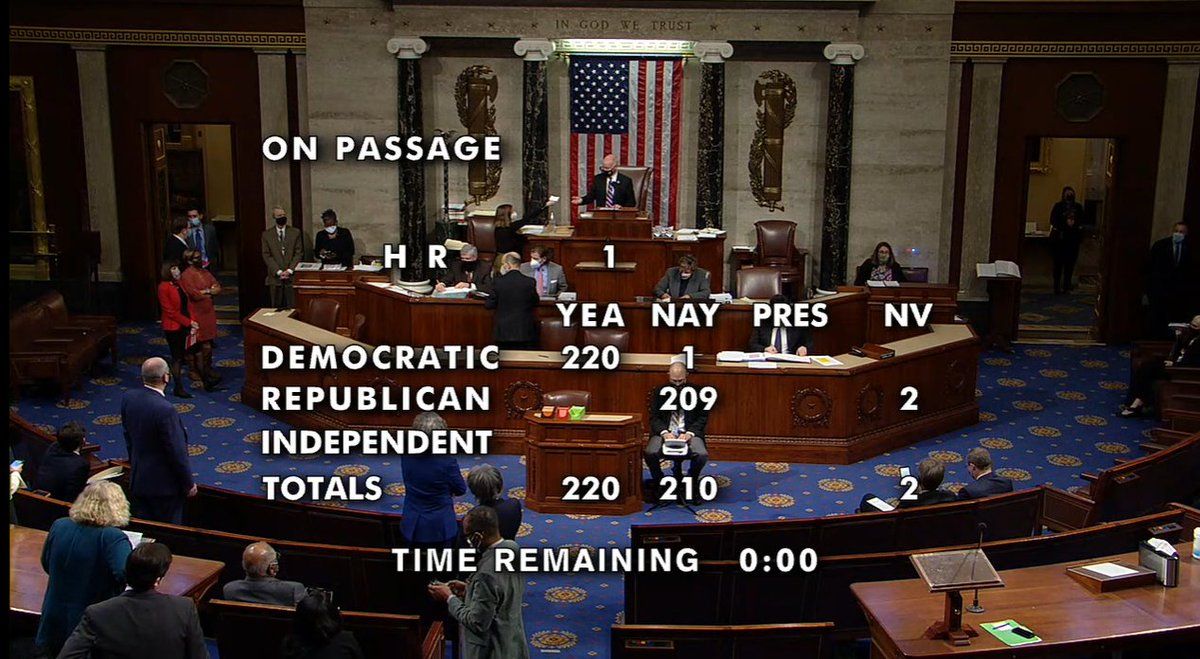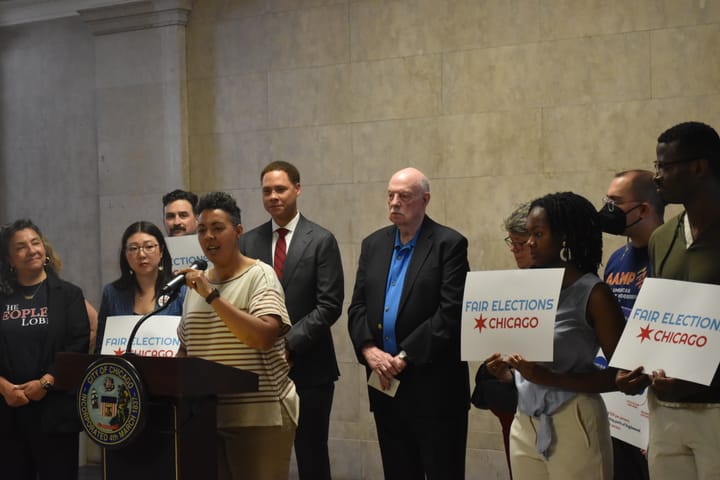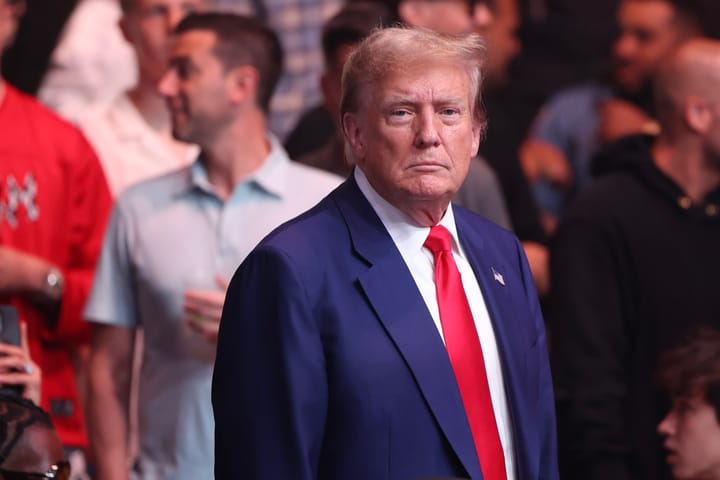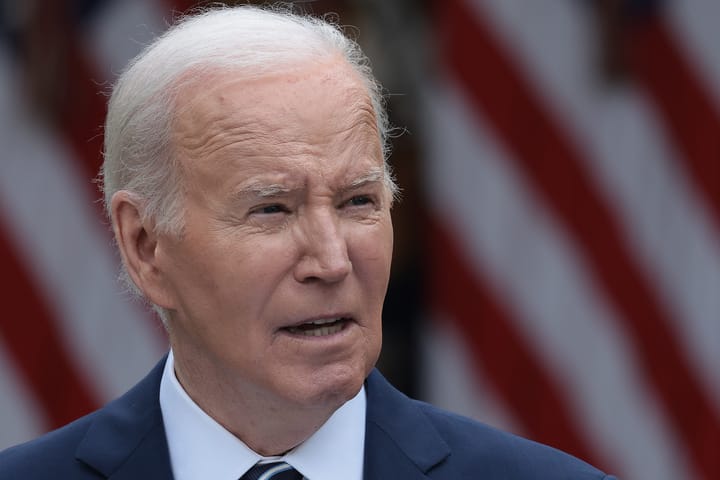House Dems Pass Sweeping Campaign Finance and Voting Reform Bill
The landmark democracy reform package moves on to a Senate hearing later this month.

The House of Representatives tonight passed H.R. 1, a package of wide-ranging democracy reforms titled the For the People Act, by a vote of 220 to 210. All Democrats besides Rep. Bennie Thompson (Miss.), and no Republicans, voted in favor.
The bill’s provisions aim to curb the influence of special interests in elections, strengthen government ethics rules, and secure access to voting, according to its supporters. H.R. 1’s changes range from eliminating partisan gerrymandering in congressional districts to establishing a public financing option for congressional campaigns that agree to abide by lower contribution limits.
“By passing this comprehensive package, the House makes clear that they are putting the American people first,” said Jana Morgan, the director of reform coalition Declaration for American Democracy. “Once the system is un-rigged, Congress can finally enact policies on the issues that Americans care most about, like affordable healthcare, clean air and water, gun violence prevention, racial justice, and so many others.”
The bill’s passage followed a set of last-minute amendments put forward by Democratic leadership to shore up support from the caucus’ centrist members who were not fully on board with the public campaign finance provisions and senior members of the Congressional Black Caucus who worried the gerrymandering changes would require states to cede control of redistricting to an independent commission.
H.R.1 will be introduced in the Senate as S. 1, and today, Senate Democrats announced that the Senate Committee on Rules and Administration will hold a hearing on it on March 24. “The For the People Act is an urgently needed remedy that will strengthen voting rights and root out corruption, so we can restore our constitutional vision of a ‘We the People’ America, and of a more perfect union,” said sponsor Sen. Jeff Merkley (D-Ore.). Majority Leader Chuck Schumer has promised it will receive a floor vote.
In the previous Congress, the House passed an earlier version of H.R. 1 along a party-line vote of 234-193, but it was not considered by the Senate, which was then under Republican control. Because the bill contains many provisions that are extraneous to the budget, it is not a candidate for passage through the reconciliation process and as a result will be subject to filibustering tactics from Senate Republicans who oppose its provisions. In an evenly split Senate with Vice President Harris as the tie-breaking vote, the bill’s passage could depend on the Democrats changing the rules so a filibuster could be broken with a bare majority.
The For the People Act would restore and modernize the Voting Rights Act, a section of which was struck down by the U.S. Supreme Court in 2013, resulting in practices such as voter roll purges and restrictive voter ID laws. The bill would provide financial support for election infrastructure, require states to implement automatic voter registration programs, and establish a vote-by-mail option and early vote periods in all states.
H.R. 1 would increase transparency in election spending by requiring “dark money” groups to disclose donors who give them more than $10,000. H.R. 1 would require politically-active groups, such as 501(c)(4) nonprofits that buy political ads, to report these funders to the Federal Election Commission within 24 hours of making a political expenditure.
Dark money organizations that funnel money through super PACs would also be required to disclose their donors if they had reason to know the money would be used for political expenditures. If H.R. 1 is signed into law, groups like the nonpartisan Campaign Legal Center say that the $750 million in dark money spending in the 2020 cycle would be made significantly more transparent for voters to look up.
The bill would also empower small-donor-fueled congressional campaigns by creating a public matching system as an option for candidates beginning in the 2028 election cycle who demonstrate their viability by raising at least $50,000 in small donations from at least 1,000 individuals. After agreeing to a $1,000 limit on further donations and a maximum of $50,000 spent out of the candidate’s pocket, among other disclosure rules, participating candidates would then have donations of up to $200 matched at a 6-1 ratio with public funds, amplifying a $25 contribution, for example, into $175 raised. In New York City, a similar public matching program enacted in 1988 has shown success in diversifying the candidate pool and increasing small-donor participation. The New York City matching funds system was strengthened in a 2018 ballot measure backed by 80% of city voters.
Other provisions in H.R. 1 would reduce Federal Election Commission gridlock in enforcing election laws, for example by reducing the number of commissioners from six to five. The bill would also close loopholes in coordination between campaigns and super PACs controlled by individuals with close ties, such as former staffers. H.R. 1 would create a “My Voice Voucher” pilot program in three states where eligible voters can request vouchers worth $25 that can be donated to qualifying congressional candidates, with the option of giving in $5 increments. Participating candidates can then redeem the vouchers for payment from the Federal Election Commission. The voucher program would be modeled after Seattle’s experiment in a voluntary public financing system for municipal campaigns, which studies have found is increasing the representativeness of the city’s small donors in terms of age, race, and income.
A recent report by the Electoral Integrity Project at Harvard University, written after surveying 800 election experts, endorsed H.R. 1 as part of a comprehensive program to restore confidence in American elections.
UPDATE: Article has been updated to note that Rep. Bennie Thompson (D-Miss.) was the Democrat who voted no.




Comments ()